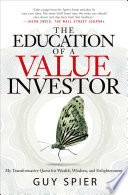

The book emphasizes the necessity of cultivating a value investing mindset, which is rooted in patience, discipline, and a long-term perspective. This mindset allows investors to look beyond short-term market fluctuations and focus on the intrinsic value of companies. The author illustrates how emotional intelligence plays a crucial role in investment decisions, advocating for a rational approach to avoid impulsive reactions to market volatility. By adopting a value investing mindset, individuals can better navigate the complexities of the financial markets and make informed decisions that align with their investment goals.
Continue readingA significant theme in the book is the importance of learning from one's mistakes. The author shares personal anecdotes about his own missteps in investing, highlighting how each failure provided valuable lessons that contributed to his growth as an investor. This idea underscores the notion that mistakes are not merely setbacks but opportunities for learning and improvement. By analyzing what went wrong and understanding the underlying reasons, investors can refine their strategies and avoid repeating the same errors in the future.
Continue readingThe book stresses the importance of thorough research and analysis in the investment process. The author discusses various methods for evaluating companies, including financial statement analysis, understanding market trends, and recognizing competitive advantages. He emphasizes that successful investing is not about following trends or relying on tips from others but about conducting independent research to make informed decisions. This rigorous approach to analysis helps investors identify undervalued stocks and make strategic investment choices.
Continue readingEmotional discipline is another critical aspect discussed in the book. The author explains how emotions can cloud judgment and lead to poor investment decisions. He advocates for developing a disciplined approach to investing, where decisions are based on analysis rather than emotions. This includes setting clear investment criteria, adhering to a well-defined strategy, and maintaining composure during market fluctuations. By cultivating emotional discipline, investors can avoid rash decisions that often result from fear or greed.
Continue readingThe book highlights the significance of building a strong professional network in the investment community. The author shares how relationships with mentors, colleagues, and industry experts can provide valuable insights and support. Networking is portrayed as a crucial element for personal and professional growth, enabling investors to exchange ideas, gain different perspectives, and stay informed about market developments. The author encourages readers to actively seek connections and foster relationships that can enhance their investment journey.
Continue readingA central tenet of value investing discussed in the book is the importance of maintaining a long-term perspective. The author argues that successful investors focus on the fundamental value of companies rather than short-term price movements. This long-term approach allows investors to ride out market volatility and benefit from the compounding effect of their investments over time. The author provides examples of how patience and a commitment to long-term goals have led to significant returns for value investors.
Continue readingThe book concludes with a discussion on the necessity of adaptability in the ever-evolving market landscape. The author emphasizes that investors must remain flexible and open to adjusting their strategies in response to changing market conditions. This adaptability is crucial for identifying new opportunities and mitigating risks. The author encourages readers to stay informed about economic trends, technological advancements, and shifts in consumer behavior, as these factors can significantly impact investment outcomes.
Continue readingThe reading time for The Education of a Value Investor depends on the reader's pace. However, this concise book summary covers the 7 key ideas from The Education of a Value Investor, allowing you to quickly understand the main concepts, insights, and practical applications in around 22 min.
The Education of a Value Investor is definitely worth reading. The book covers essential topics including The Importance of a Value Investing Mindset, Learning from Mistakes, The Role of Research and Analysis, providing practical insights and actionable advice. Whether you read the full book or our concise summary, The Education of a Value Investor delivers valuable knowledge that can help you improve your understanding and apply these concepts in your personal or professional life.
The Education of a Value Investor was written by Guy Spier.
If you enjoyed The Education of a Value Investor by Guy Spier and want to explore similar topics or deepen your understanding, we highly recommend these related book summaries:
These books cover related themes, complementary concepts, and will help you build upon the knowledge gained from The Education of a Value Investor. Each of these summaries provides concise insights that can further enhance your understanding and practical application of the ideas presented in The Education of a Value Investor.